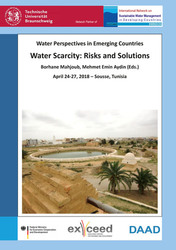| Fachbereiche | |
|---|---|
| Buchreihen (97) |
1382
|
| Nachhaltigkeit |
3
|
| Gesundheitswesen |
1
|
| Geisteswissenschaften |
2372
|
| Medienwissenschaften | 16 |
| Theologie | 57 |
| Philosophie | 102 |
| Rechtswissenschaft | 423 |
| Wirtschaftswissenschaften | 853 |
| Sozialwissenschaften | 417 |
| Sportwissenschaften | 48 |
| Psychologie | 233 |
| Pädagogik | 190 |
| Geschichtswissenschaften | 183 |
| Kunstwissenschaften | 111 |
| Kulturwissenschaften | 166 |
| Literaturwissenschaften | 117 |
| Sprachwissenschaften | 89 |
| Naturwissenschaften |
5408
|
| Ingenieurwissenschaften |
1798
|
| Allgemein |
98
|
|
Leitlinien Unfallchirurgie
5. Auflage bestellen |
|
Erweiterte Suche
Water Scarcity: Risks and Solutions
Water Perspectives in Emerging Countries, April 24-27, 2018 – Sousse, Tunisia
Müfit Bahadir (Herausgeber)Vorschau
Leseprobe, PDF (190 KB)
Inhaltsverzeichnis, PDF (120 KB)
The progressive developments of all sectors and the present water policy in the MENA countries have resulted in a difficult water shortage. In fact, one of the most critical challenges nowadays is the drastically decreasing water availability per capita in most of the MENA States. Cities, industries, agriculture and the environment are seriously impaired. Several cities in the MENA region have literally run out of water recently, resulting in major havoc and costs for citizens, business and government. Water scarcity and droughts severely affect local communities and disrupt supply chains through disseminating agricultural production and limiting industrial production. Scarcity is expected to intensify with most forms of economic development, and as a result of extreme variability in climate. If unmitigated, extreme droughts will have an aggravating impact on economies, societies and the environment in the MENA region and in all parts of the world. To cope with the water scarcity situation, water-use efficiency across all sectors should be substantially increased and sustainable withdrawals should be ensured. Moreover, exploitation of non-conventional water supplies is regarded being a valuable option for all countries despite their sharply contrasting water situation. In addition, water pollution issues are of high priority and crucial to address to stakeholders in terms of environment, health, and agriculture, and involving them into related R&D projects. Involving higher education sector through universities is to guarantee analyzing the problems and investigating new approaches while transferring knowledge and practical skills.
| ISBN-13 (Printausgabe) | 9783736998414 |
| ISBN-13 (E-Book) | 9783736988415 |
| Buchendformat | B5 |
| Sprache | Englisch |
| Seitenanzahl | 268 |
| Umschlagkaschierung | matt |
| Auflage | 1. |
| Erscheinungsort | Göttingen |
| Erscheinungsdatum | 31.07.2018 |
| Allgemeine Einordnung | Sachbuch |
| Fachbereiche |
Mensch und Umwelt
|
| Schlagwörter | Water policy MENA countries, decreasing water availability, water pollution |








